From dissensions: Gerry Adams, TD
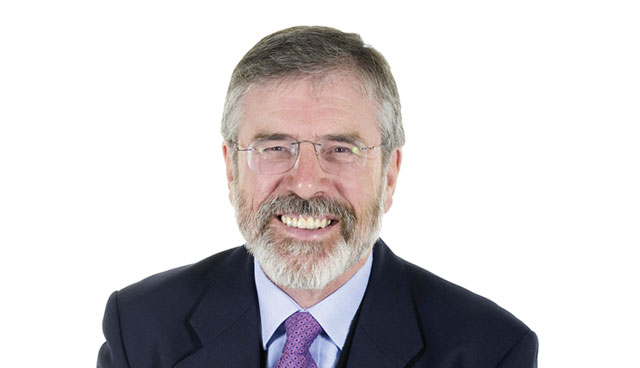
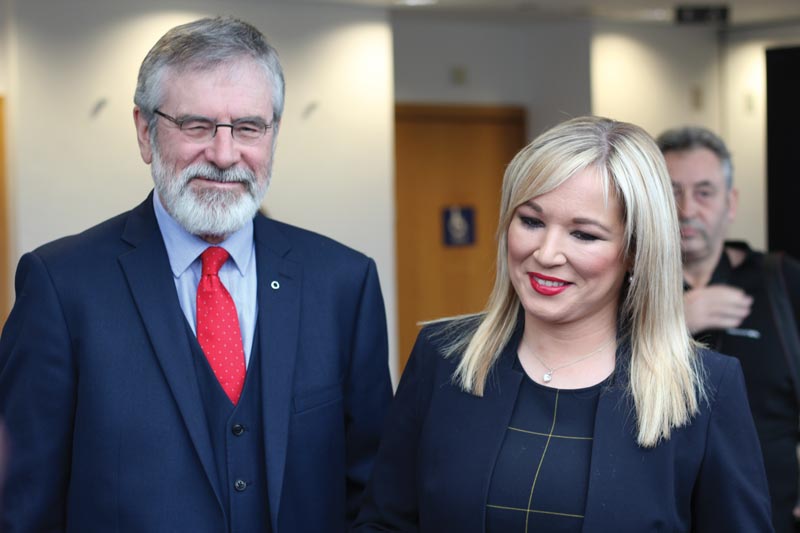
In 2017, Gerry Adams, President of Sinn Féin, eclipsed Éamon de Valera’s record 33 years as figurehead of an Irish political party. Ciarán Galway visits Leinster House ahead of the summer recess to gauge a sense of his party’s current trajectory.
Upon contesting the 2011 General Election, his first foray into southern electoral politics, Gerry Adams topped the poll in Louth. Again in 2016, the Sinn Féin leader secured the most first preference votes in the constituency with effective vote management ensuring the successful election of Imelda Munster as a second TD. Sinn Féin’s annexation of the fifth floor in Leinster House, previously occupied by the Labour Party, is just one of the demonstrable symbols of the party’s steady growth over the last decade.
Sinn Féin now has a combined 534,000 votes from across the Irish General Election constituencies and the UK General Election constituencies in the North. How has this been possible?
A lot of it is down to the hard work of many unsung heroes over a period of many years. We have been building the party and developing our policies. We are developing outreach coalitions, broad and informal alliances on that front, while attempting to bring forward practical republican alternatives to austerity and punitive policies. We want to see a united Ireland and we want to be a party which can move forward into a real republic as envisaged in the 1916 Proclamation.
When you pursue all this work it’s much like sowing seeds; they eventually begin to bloom and to blossom. We are also at that point due to a convergence of different issues. People now enjoy the benefits of the peace process and outworkings of the Good Friday Agreement even though it has been difficult and very slow.
All of it is as a result of the diligence of many people right across the island and also internationally, particularly among those who support Sinn Féin in the USA and in Britain. However, we have an awful lot more to do. This is only a stage in the process and we’re not finished yet.
What do you regard as Sinn Féin’s greatest successes and failures over the last 10 years?
I think our greatest success has been to mobilise people who may have thought themselves to be powerless and to motivate them to the realisation that one person can make a difference. More and more people are embracing the idea that change is necessary and that we can establish alternative solutions when it comes to health services, housing, poverty and socio-economic questions. The watchword is equality. One of our successes has been our ability to coalesce with others around the broad principle of equality.
With regards to failure, we are failing all the time. Samuel Beckett said, “Ever tried. Ever failed. No matter. Try again. Fail again. Fail better.” The person who doesn’t fail doesn’t succeed. You have to be able to absorb the failures. I couldn’t identify a big failure that strikes me at this moment. We want to be in government in this State and we need a mandate for that. There are myths peddled by our opponents that we’re not really interested. We are interested. But we have to secure a mandate.
Can you envisage a scenario in which Sinn Féin would enter Irish government as a minority partner?
Our position is very clear and that issue would have to be decided by the Ard Fheis. But I actually think it is a mistake, and I’ve said this to our own people, to complicate things by surmising about the possible coalitions that we may or may not be part of. The vote that Sinn Féin will get determines that. Likewise, with the other parties, the outcome of their electoral efforts and depending on which potential partners are available, will indicate their position.
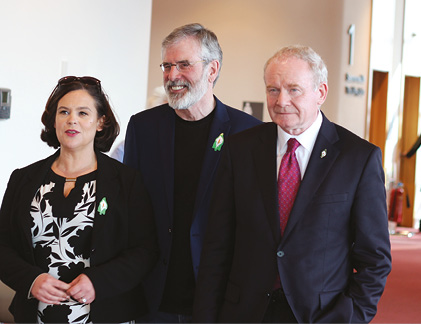
Deputy leader, Sinn Féin, Mary-Lou McDonald; Gerry Adams and the late Martin McGuinness.
To be absolutely clear in our message to the people: we want to be in government. We want to bring our policies with us. We didn’t cause the mess in this State. The other parties have had 70-80 years to do what they have been doing. We offer an alternative; give us a chance. If we get enough votes, then it is a matter of negotiating a programme for government. If we get that then it is matter for the Ard Fheis to decide.
Was Sinn Féin outmanoeuvred in Good Friday negotiations with the British Government with regards to the ambiguous language pertaining to a border poll?
I think that’s a fair enough point. However, the calling of a border poll is above the pay scale for any British Secretary of State. It was never going to be down to James Brokenshire or whomever the next ‘Shire’ is in that job. When an Irish Government asks the British Government for a referendum it will happen. That’s why there is ongoing work of debating the conditions for Irish unity, what kind of Ireland we want, an agreed Ireland, a new Ireland and an Ireland in which unionism can be secure and have ownership. That’s the big challenge.
We have stated that we would like to see a referendum within the next five years. I think that is a very reasonable demand. We would look to the other parties who embrace the united Ireland objective to support this. I have just written to the Taoiseach, to the new Minister for Foreign Affairs and to the other political party leaders here to suggest the idea of a joint Oireachtas committee on Irish unity in order to explore what that would be like, to start a process of consultation and discussion, to figure out how to achieve it and how to trigger a border poll. Michelle O’Neill has written to the British Secretary of State to obtain the criteria from him.
What we’re arguing for is a planning process. In the history of this State, no government has actually planned for Irish unity. What we’re looking for is thoughtful, it isn’t ‘in your face’ or dogmatic.
Is there a strategy for ‘unlocking’ unionist opposition?
We need to be adept at listening. Going back to your earlier question about failures. I suppose there is a profound failure across the island of Ireland, particularly for the political classes, to bridge the gap between orange and green. That’s an historical failure and an artificial division. But for all the good work that has been done with grassroots unionism and many decent people through outreach, listening and trying to understand one and other, it is a profound failure that must be corrected if we are to create the type of Ireland in which there can be both harmony and equality.
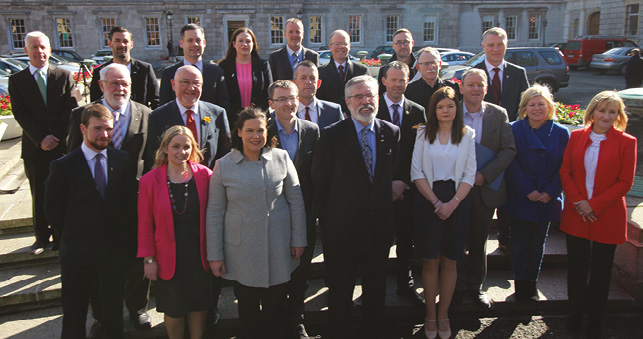
Sinn Féin’s new Dáil Éireann contingent after General Election 2016.
“I suppose there is a profound failure across the island of Ireland, particularly for the political classes, to bridge the gap between orange and green. That’s an historical failure and an artificial division.”
We have hosted a series of conferences over the last number of years and have always had a very open door policy. We have had unionists on the platform and people arguing against unity. We’re going to continue with that. We also have much below-the-radar engagement with civic unionism, with people who are involved in various sectors and would be unionist, if not particularly politically active.
“I have never subscribed to the notion of a left-wing government, certainly not in the short term, I mean, who are the left?” Is this an indication that Sinn Féin is undergoing an ideological shift?
No. It was clumsily worded by me. I do envisage a left-wing government, but what I was asking is where are the left? Sinn Féin regards itself very much as part of the left. Look around the Chamber here, there are a handful of other people, but they couldn’t form a government. What we need to do is coalesce around people of a like mind. We don’t need to agree on everything, but there is a lot of commonality. We saw it in the water charges campaign, we see it in the bin charges campaign, we see it in campaigns for hospital waiting lists to be dealt with and the housing crisis to be tackled.
I think it’s a mistake to limit it to the political configurations. I find that there is increasing need for contact with people in the community and voluntary sector who aren’t necessarily affiliated to anyone but do, and this has been my experience in the North, generally share the same vision as us. It is about fairness, it is about equality, it is about decency and, broadly speaking, it’s about society minding people as opposed to people being producers within an economy that is all about profit.
There is a wide breadth of opinion out there that can be unified for change. What we have to do is convince them that we are the party for change. That’s our responsibility and our challenge.
Do media characterisations of Sinn Féin in 2017 as ‘old Sinn Féin’ and ‘new Sinn Féin’ irritate you?
I’m long used to the idiosyncrasies of lazy journalism and sometimes of hostile journalism. It is a great strength for any party to have multigenerational appeal. That we have people with the energy of youth alongside other people with experience, and a mutual mentoring process, provides us with a very good blend. The party is in a strong position.
The party is also in transition. I make no bones about the fact that we are in a generational transition at the same time as society is in transition. We have been engaged in a very big outreach from our grassroots to our national leadership. We have organised a number of conferences and we want to develop a broad 10-year plan for the year ahead. We are due to hold another outreach in the autumn. It’s a bit behind time because we have fought two elections this year and obviously that has eaten into our available time. Getting fit for purpose combines training the party membership, setting objectives, setting targets, and also facilitating a change in leadership. I am going to go. It is a matter of when I go, not if I go, as part of that transition process.
What are the current priorities for Sinn Féin and what is the vision?
The big challenge at this time are the dire consequences posed by Brexit. We have argued very strongly that the Government here must act in the national interest on behalf of the people on this island. The people of the North voted to remain in the European Union. That should be the cornerstone of the Government’s position. Currently, it isn’t.
We have argued for a special designated status for the North within the EU. That means facing up to the British. The Government has not done this and it is an ongoing work in progress for us to persuade them that is the right course of action. This is our big political priority.
We also need to see the restoration of the political institutions in the North. We return to that once the summer is over. We need to have a place where the two constituencies, and a further constituency which would not let itself be defined by the broad nationalist and unionist traditions, can be moderated. The best place for this to be done is in a forum which is fair and which serves everyone.
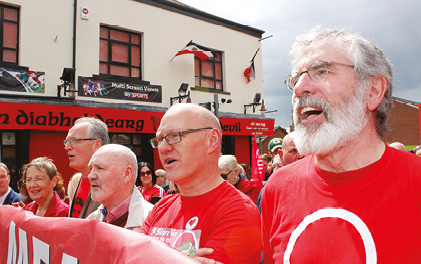
Gerry Adams and party colleagues pictured at an Acht na Gaeilge protest in Belfast’s Gaeltacht Quarter.
Our position is very straightforward. There was a basis for these institutions to function which has not been operational in recent times. That needs to return as the cornerstone for sustainable institutions. Even if we capitulated and acquiesced to facilitate a return to government now, it wouldn’t stand because of Brexit, because of the pressures that will be on people, because of Tory austerity cuts and because of the way, particularly the younger generation, who may be quiet and not as ‘in-your-face’ as the Civil Rights generation, are politely saying, ‘we want our rights’. I find that with an entire generation of young people, who weren’t particularly tuned in, have been politicised in the last two years.
How acutely is Martin McGuinness’ absence felt?
It’s felt more acutely in a personal context. All of us are replaceable politically. Somebody else may do it differently and while you can’t replace Martin McGuinness, the next person must be treated on their merits, not in comparison to Martin.
Personally, there hasn’t been a day gone by since he passed that I haven’t thought about him four or five times. He was actually going to come out of his role in OFMDFM on 8 May. I know that he and his wife Bernie were looking forward to that. Now, he wasn’t going to retire or step down from his position in the Sinn Féin leadership, but he was coming out of that intensity of working for 10 years with Ian Paisley, Peter Robinson and more recently Arlene Foster.
That’s life, but it’s still unfair that a man who appeared to be in the fullness of his health last summer and was only conscious of being sick just a few short months ago, has now gone. At some point in the grieving process, you accept that the person is gone. Intellectually I accept that he has gone, but emotionally it’s still very, very difficult and it’s worse for his family.
Which persons from modern Irish history, if any, would you most closely identify with?
I think Bobby Sands from my own time and, though it’s recent and still very sore, Martin McGuinness who is now an historical figure. Liam Mellows was very far-sighted, he was also a very practical republican. During the Treaty debates, he famously said that the difficulty with partition was that men would get into power and once they did so, they would not want to relinquish that power. I think that has proved to be very prophetic.
For me it’s all about the future. That’s what Liam Mellows was about, that’s what Bobby Sands was about and that’s what Máire Drumm, Mairéad Farrell and Martin McGuinness were about. We must be likewise; always looking to the tomorrow and the day after, realising that we can actually make change and that we are the living proof that it is possible.





